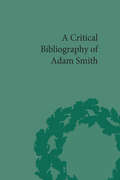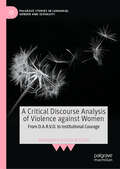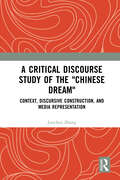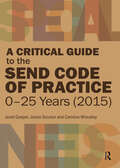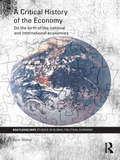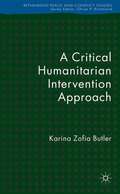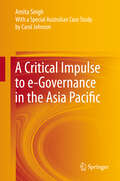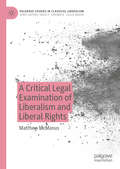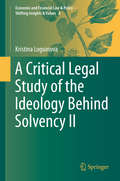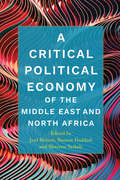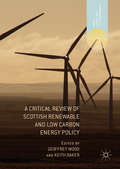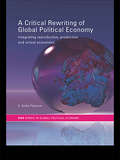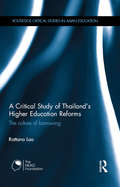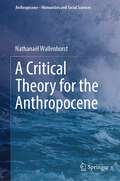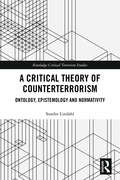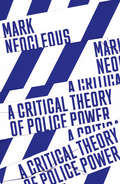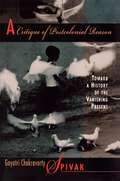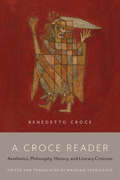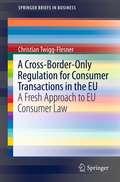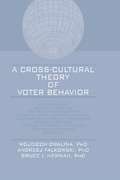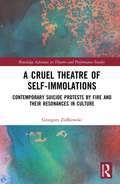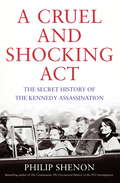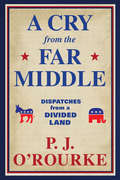- Table View
- List View
A Critical Bibliography of Adam Smith
by Hiroshi MizutaThis critical bibliography of Adam Smith takes as its starting point the Kress Library of Business and Economics’ 1939 catalogue of its Vanderblue Collection of Smithiana. Since the bicentenary of The Wealth of Nations in 1976, the rate of international publication markedly accelerated, significantly extending the scope of this bibliography beyond 1939. Its scope has been further enlarged via the inclusion of essays on the diffusion process while the inclusion of all works in the chronological main bibliography gives an overview of the scope of this process. The notes appended to the entries provide a running commentary to the gathering pace of publication and the entries are organised chronologically with systematic annotation throughout.
A Critical Discourse Analysis of Violence against Women: From D.A.R.V.O. to Institutional Courage (Palgrave Studies in Language, Gender and Sexuality)
by Giuseppina Scotto di CarloThis book presents a critical analysis of the language surrounding Violence against Women and Girls (VAWG), demonstrating how discourse can both sustain harm and serve as a catalyst for healing and change. Grounded in Critical Discourse Analysis (CDA), it examines the &“DARVO&” tactic—Deny, Attack, Reverse Victim and Offender (Freyd, 1997)—a manipulative strategy used by perpetrators to evade accountability, silence survivors, and reinforce a culture of victim-blaming. Through detailed case studies, the book uncovers the broader societal structures that enable and normalise these behaviours. To counteract these harmful dynamics, the author introduces the concept of &“institutional courage&” (Freyd, 1997), providing a framework for institutions to respond more effectively and empathetically to VAWG. Ultimately, the book advocates for a shift in both individual and institutional responses, urging a collective commitment to challenge DARVO and adopt institutional courage in the fight against VAWG. This work will be of particular interest to scholars, practitioners, and students across Linguistics, Women&’s and Gender Studies, Sociology, and Institutional Discourse.
A Critical Discourse Study of the "Chinese Dream": Context, Discursive Construction, and Media Representation (Cultural Discourse Studies Series)
by Junchen ZhangZhang’s book focuses on the analysis of the sociohistorical context, linguistic patterns of discursive construction, and media representations of the “Chinese Dream” in Mainland China, Hong Kong, and the United States.Analyzing data from the Chinese leader’s speeches and articles from China Daily, the South China Morning Post, and the New York Times, the author provides insights into the understanding of contemporary Chinese society through a critical discourse analysis of the “Chinese Dream” and its mediatized construction. Focusing on the discursive construction, the book examines the Chinese leader Xi Jinping’s narratives on the “Chinese Dream” from multidimensional perspectives, such as thematic representations, discursive strategies, and narrative frames, which emphasize the overall structure of the “Chinese Dream” as a political discourse. Methodologically, Zhang combines a discourse-historical approach, corpus linguistics, and framing analysis into a complementary framework, which draws merits from the three approaches.This innovative research volume will be of interest to academics, researchers, and students in the fields of discourse analysis, political research, Chinese politics, and East Asian studies.
A Critical Guide to the SEND Code of Practice 0-25 Years (2015)
by Jackie Scruton Janet Goepel Caroline WheatleyYou will find this an indispensable resource if you are involved with children or young people with special educational needs or disability.Uncover the intricacies of statutory rules and responsibilities outlined in the code of practice through our accessible guide, which bridges the gap between policy and real-world application. Engaging case studies and critical insights throughout the book help you to understand and interpret these in context.Professionals and practitioners will be able to identify complexity and dilemmas, understand perspectives that may be different from their own, and consider theoretical frameworks that encourage and support critical thinking and reflection.Whether you're a trainee, teacher, SENCO, or a health and social care professional, this practical guide to the SEND Code of Practice is your go-to, essential companion. Parents, carers and families of these children will also find it invaluable. Get ready to transform theory into actionable insights and make a lasting impact on the lives of those you work with.
A Critical History of the Economy: On the birth of the national and international economies (RIPE Series in Global Political Economy)
by Ryan WalterDrawing on recent debates in critical International Political Economy, this book mobilizes the idea that the economy does not exist separately from society and politics to develop a detailed intellectual history of how the economy came to be seen as an independent domain. In contrast to typical approaches to writing the history of economic thought, which assume the reality of the economy, the author describes the forms of intellectual argument that made it possible to conceive of the national and international economies as objects of intellectual inquiry. At the centre of this process was the analytical separation of power and wealth. Walter thus offers a broad historical perspective on the emergence of current IPE theory, while linking the field with contextualist intellectual history. This important and innovative volume will be of strong interest to students and scholars of International Political Economy, International Relations, Economics, History and Political Theory.
A Critical Humanitarian Intervention Approach (Rethinking Peace and Conflict Studies)
by Karina Zofia Butler née PawlowskaA Critical Humanitarian Intervention Approach explores ways of reconceptualising security in terms of Ken Booth's Theory of World Security. This approach, focusing on human development more broadly can improve upon the theoretical and practical limitations of solidarist theories on the subject of humanitarian intervention.
A Critical Impulse to e-Governance in the Asia Pacific
by Amita SinghThis book presents a comparative study of the vision, ability and dynamism on the part of governments in selected Asian Pacific countries as they engage in the distribution of e-governance. Consequently, it creates a platform for mutual learning and offers a dispassionate evaluation of mega e-projects. It is an interdisciplinary study of information and communication technology within mainstream social science research and attempts to bridge the gap in empirical research between the nature of technology and the manner in which it is governed. The analysis shows that hegemonic and panoptic structures of surveillance and control may derail efforts to establish sustainable e-governance, while a liberal futuristic framework with open socio-technology networks on Big Data analytics, IPv6 and Cloud Computing may strengthen the trend towards democratizing institutions. Further, the book highlights the extraordinary energy being generated in the emerging new world through their use of the internet and suggests how governments could translate this into a new wealth of economic opportunities, social inclusion and equitable development, in addition to achieving the MDGs (Millenium Development Goals). Lastly, it emphasizes the importance of a visionary approach, which, wherever present, has been able to sustain e-governance by meaningfully linking the micro to the macro and heritage to the horizon.
A Critical Introduction to Khomeini
by Arshin Adib-MoghaddamAs the architect of the Iranian Revolution of 1979, Ayatollah Khomeini remains one of the most inspirational and enigmatic figures of the twentieth century. The revolution placed Iran at the forefront of Middle East politics and of the Islamic revival. Twenty years after his death, Khomeini is revered as a spiritual and political figurehead in Iran and in large swathes of the Islamic world, while in the West he is remembered by many as a dictator and as the instigator of Islamist confrontation. Arshin Adib-Moghaddam brings together both distinguished and emerging scholars in this comprehensive volume, which covers all aspects of Khomeini's life and critically examines Khomeini the politician, the philosopher, and the spiritual leader. The book details Khomeini's early years in exile from Iran, the revolution itself, and events that took place thereafter including the hostage crisis and the Iran-Iraq war. Lastly, the book considers his legacy in Iran where Khomeini's image has been used by both reformist and conservative politicians to develop their own agendas and further afield in other parts of the Islamic world and in the West. Written by scholars from varying disciplinary backgrounds, the book will prove invaluable to students and general readers interested in the life and times of Khomeini and the politics of Islam that he inspired.
A Critical Legal Examination of Liberalism and Liberal Rights (Palgrave Studies in Classical Liberalism)
by Matthew McManusThis book has two aims. First, to provide a critical legal examination of the liberal state and liberal rights in the law, and secondly, to present a systematic alternative to liberal approaches to both the law and rights, grounded in a left wing conception of human dignity. At the opening of the 21st century a remarkable thing happened. Liberalism, once considered the only doctrine left standing at the end of history, began to face renewed competition from both the political left and the post-modern conservative right. This book argues that the way forward is not to abandon, but to radicalize, the potential of the liberal project. Analysing major theoretical positions in order to build a critical genealogy of liberal rights, McManus lucidly develops a left wing alternative to the classic liberal approach to rights drawing on the traditions of liberal egalitarians and deliberative democracy theory. Societies, he argues, should be committed to advancing the human dignity of all through the enshrinement of certain rights into positive state law, the expansion of democracy and a resolute commitment to economic equality.
A Critical Legal Study of the Ideology Behind Solvency II (Economic and Financial Law & Policy – Shifting Insights & Values #4)
by Kristina LoguinovaThis book analyzes the impact of Solvency II. In recent years, EU legislators have sought to introduce fundamental reforms. Whether these reforms were indeed fundamental is critically investigated with regard to a post-crisis piece of financial legislation affecting the EU’s largest institutional investors: Solvency II. Namely, the last financial and economic crisis, the worst financial catastrophe of the last decade, revealed that financial law in particular was not sufficiently mature to maintain the existence of a robust and trust-worthy financial system that could protect society from economic decline. The work also makes concrete recommendations on achieving a more sustainable future. As such, it offers a valuable resource for anyone who is interested in the financial system, the EU political economy, insurance, sustainability, and Critical Legal Studies.
A Critical Political Economy of the Middle East and North Africa (Stanford Studies in Middle Eastern and Islamic Societies and Cultures)
by Joel Beinin, Bassam Haddad, and Sherene SeikalyThis book offers the first critical engagement with the political economy of the Middle East and North Africa. Challenging conventional wisdom on the origins and contemporary dynamics of capitalism in the region, these cutting-edge essays demonstrate how critical political economy can illuminate both historical and contemporary dynamics of the region and contribute to wider political economy debates from the vantage point of the Middle East. Leading scholars, representing several disciplines, contribute both thematic and country-specific analyses. Their writings critically examine major issues in political economy—notably, the mutual constitution of states, markets, and classes; the co-constitution of class, race, gender, and other forms of identity; varying modes of capital accumulation and the legal, political, and cultural forms of their regulation; relations among local, national, and global forms of capital, class, and culture; technopolitics; the role of war in the constitution of states and classes; and practices and cultures of domination and resistance. Visit politicaleconomyproject.org for additional media and learning resources.
A Critical Review of Scottish Renewable and Low Carbon Energy Policy (Energy, Climate and the Environment)
by Keith Baker Geoffrey WoodThis book offers comprehensive coverage of current energy policy in Scotland focussing on non-fossil fuel energy options: renewables, nuclear power and energy efficiency. Covering issues of policy and practice, planning, legislation and regulation of a range of sustainable energy technologies in the context of devolved government, key experts explore these issues in terms of the ongoing Scottish independence debate, Brexit and further devolution in this vitally important and timely book. The book emphasises two further distinctive areas: constitutional change and the role of sub-national authorities in renewable and low carbon energy policy and practice. The clear focus on renewable and low carbon energy policy and practice and sub-national authority level of governance of energy means that it will be of particular relevance as a case study for those countries either in the process of deploying renewable and/or low carbon energy technologies or looking to do so. The authors discuss the many lessons to be learnt from the Scottish and UK experience. By providing a critical analysis of Scottish renewable and low carbon energy policy and practice, this book is invaluable to students, practitioners and decision-makers interested in renewable and low carbon energy transitions, energy planning and policy.
A Critical Rewriting of Global Political Economy: Integrating Reproductive, Productive and Virtual Economies (RIPE Series in Global Political Economy)
by V. Spike PetersonMoving beyond a narrow definition of economics, this pioneering book advances our knowledge of global political economy and how we might critically respond to it.V. Spike Peterson clearly shows how two key features of the global economy increasingly determine everyday lives worldwide. The first is explosive growth in financial markets that shape business decision-making and public policy-making, and the second is dramatic growth in informal and flexible work arrangements that shape income-generation and family wellbeing. These developments, though widely recognized, are rarely analyzed as inextricable and interacting dimensions of globalization. Using a new theoretical model, Peterson demonstrates the interdependence of reproductive, productive and virtual economies and analyzes inequalities of race, gender, class and nation as structural features of neoliberal globalization. Presenting a methodologically plural, cross-disciplinary and well-documented account of globalization, the author integrates marginalized and disparate features of globalization to provide an accessible narrative from a postcolonial feminist vantage point.
A Critical Study of Thailand's Higher Education Reforms: The culture of borrowing (Routledge Critical Studies in Asian Education)
by Rattana LaoThis book offers a critical examination of contemporary higher education reforms in Thailand situated in the broader historical, socio-economic and political changes. Through a qualitative case study with three methods of inquiry, this book explores why different 'global education policies' such quasi-privatisation, internationalization, as quality assessment (QA) have resonated in Thailand higher education sector. Grounded in policy borrowing and lending, this book uses the politics, economics and culture of borrowing to analyse major reforms in Thailand for the past one hundred years. It is argued that historical legacy, policy contexts and belief systems of policy elites play pivotal roles in facilitating policy changes or the lack thereof. While historical analysis elucidates that the Thai state has always been an active borrower of western ideas, the perseverance of the 'Thai-ness' discourse has often been used to suggest its so-called independence and idiosyncrasy. This in-depth analysis of the Thai case aims to contribute to the critical studies in Asian education, comparative higher education, policy borrowing and lending and Thai studies. The Culture of Borrowing intensively studies the policy appropriation in the Thai education system by analysing: • Selective Borrowing and the Historical Development of Thai Higher Education • The Asian Economic Crisis as Window of Opportunity: Autonomous University • Internationalization of Teaching: Quantitative and Qualitative Challenges • The Emergence of Quality Policies and their Rationales • The Intended and Unintended Consequences of Quality Policies This book will appeal to researchers in Education, particularly to scholars studying educational policies within the context of tertiary education. It will also interest scholars specialising in Asian and South-east Asian Studies.
A Critical Theory for the Anthropocene (Anthropocene – Humanities and Social Sciences)
by Nathanaël WallenhorstThis volume, which is rooted in biogeophysical studies, addresses conceptions of political action in the Anthropocene and the tension between a desire to accomplish the Promethean project of modernity and a post-Promethean approach. This work explores the idea of an anthropological mutation of political consolidation from a “post-Promethean togetherness”, to creating the capacity to act together. The political thinking of the human condition developed by Hannah Arendt is important here as a resource for thinking about humanity in terms of human adventure. This has three dimensions: hubris, the world and coexistence referring respectively to the logic of profit of the homo oeconomicus, the logic of responsibility of the homo collectivus and the logic of the hospitality of the homo religatus. The intellectual and political attitude outlined in this book is an extension of critical theory: the work also puts forward a critique of what poses a problem in our relationship to the world and suggests how to overcome it, the ultimate goal being social transformation. The author propose an uprising and an anthropological consolidation of politics based on the revitalization that is brought about by the sharing of a conviviality both between humans and with what is non-human. The identification of conviviality as an educational paradigm to survive the Anthropocene gives us the much needed reason for hope despite this heritage of the Anthropocene. In addition to Arendtian thinking, this critical theory for the Anthropocene draws on the political thinking of several contemporary authors including Maurice Bellet, Hartmut Rosa, Andreas Weber, Dominique Bourg, and Christian Arnsperger. This volume is of interest to researchers in the Anthropocene.
A Critical Theory of Counterterrorism: Ontology, Epistemology and Normativity (Routledge Critical Terrorism Studies)
by Sondre LindahlThis book offers a theory and model of counterterrorism based on emancipation and non-violence. Critical Terrorism Studies (CTS) scholars have produced wide-ranging and rich critiques of terrorism-related research, as well as state counterterrorism policies and practices. This work aims to fill in a gap in the current literature by constructing an original and specifically CTS model of counterterrorism. The model outlines the basic assumptions, priorities, principles, strategies and tactics, measures and evaluation of counterterrorism. It challenges prevalent models of counterterrorism through a radical rethinking of the ontology, epistemology and the agenda of counterterrorism. The model aims to prevent future acts of terrorism by (1) re-conceptualising how we study and understand terrorism, and; (2) suggesting that our efforts to counter and prevent terrorism must commensurate with the goals we want to achieve. Essentially, this involves a commitment to emancipation, and a rejection of violence as a tool. The second part of the book is a case study of Norwegian counterterrorism which shows how the theory and model developed in the book can be used. This is the first substantial analysis of Norwegian counterterrorism in almost ten years, and produces encouraging findings which support the potential for non-violent solutions to terrorism. This book will be of particular interest to students of terrorism and counterterrorism, critical security studies, and international relations in general.
A Critical Theory of Police Power: The Fabrication of the Social Order
by Mark NeocleousPutting police power into the centre of the picture of capitalismThe ubiquitous nature and political attraction of the concept of order has to be understood in conjunction with the idea of police. Since its first publication, this book has been one of the most powerful and wide-ranging critiques of the police power. Neocleous argues for an expanded concept of police, able to account for the range of institutions through which policing takes place. These institutions are concerned not just with the maintenance and reproduction of order, but with its very fabrication, especially the fabrication of a social order founded on wage labour. By situating the police power in relation to both capital and the state and at the heart of the politics of security, the book opens up into an understanding of the ways in which the state administers civil society and fabricates order through law and the ideology of crime. The discretionary violence of the police on the street is thereby connected to the wider administrative powers of the state, and the thud of the truncheon to the dull compulsion of economic relations.
A Critique of Postcolonial Reason
by Gayatri Chakravorty SpivakAre the "culture wars" over? When did they begin? What is their relationship to gender struggle and the dynamics of class? In her first full treatment of postcolonial studies, a field that she helped define, Gayatri Chakravorty Spivak, one of the world's foremost literary theorists, poses these questions from within the postcolonial enclave. "We cannot merely continue to act out the part of Caliban," Spivak writes; and her book is an attempt to understand and describe a more responsible role for the postcolonial critic. A Critique of Postcolonial Reason tracks the figure of the "native informant" through various cultural practices--philosophy, history, literature--to suggest that it emerges as the metropolitan hybrid. The book addresses feminists, philosophers, critics, and interventionist intellectuals, as they unite and divide. It ranges from Kant's analytic of the sublime to child labor in Bangladesh. Throughout, the notion of a Third World interloper as the pure victim of a colonialist oppressor emerges as sharply suspect: the mud we sling at certain seemingly overbearing ancestors such as Marx and Kant may be the very ground we stand on. A major critical work, Spivak's book redefines and repositions the postcolonial critic, leading her through transnational cultural studies into considerations of globality.
A Critique of Proportionality and Balancing
by Urbina Francisco J.The principle of proportionality, which has become the standard test for adjudicating human and constitutional rights disputes in jurisdictions worldwide has had few critics. Proportionality is generally taken for granted or enthusiastically promoted or accepted with minor qualifications. A Critique of Proportionality and Balancing presents a frontal challenge to this orthodoxy. It provides a comprehensive critique of the proportionality principle, and particularly of its most characteristic component, balancing. Divided into three parts, the book presents arguments against the proportionality test, critiques the view of rights entailed by it, and proposes an alternative understanding of fundamental rights and their limits.
A Croce Reader: Aesthetics, Philosophy, History, and Literary Criticism
by Massimo VerdicchioBenedetto Croce was a historian, humanist, political figure, and the foremost Italian philosopher of the early twentieth-century. A Croce Reader brings together the author’s most important works across the fields of aesthetics, philosophy, history, literary criticism, and the Baroque and presents the “other” Croce that has been erased by scholarly tradition, including by Croce himself. Massimo Verdicchio traces the progress of Croce as a thinker, focusing on his philosophy of absolute historicism and its aesthetic implications. Unlike other anthologies, A Croce Reader includes essays from the Aesthetics of 1902 and key studies on Vico, Hegel, and Pirandello. Verdicchio’s masterful translation of the source material welcomes specialists and non-specialists alike to discover the “other” Croce for themselves.
A Cross-Border-Only Regulation for Consumer Transactions in the EU: A Fresh Approach to EU Consumer Law (SpringerBriefs in Business)
by Christian Twigg-FlesnerFor almost three decades, the European Union (EU) has adopted measures to regulate consumer transactions within the internal market created by the EU Treaties. Existing legislation is largely based on directives harmonizing aspects of national consumer laws. This Brief argues that a more appropriate approach for EU consumer law would be legislation in the form of a regulation which is applicable to cross-border transactions only. The author considers the constitutional constraints of the EU Treaties, before examining the case for a cross-border-only measure. He argues that the cross-border approach is preferable, because it would provide clearer benefits for consumers seeking to buy goods and services across borders, while not upsetting domestic law unnecessarily--in particular in the context of e-commerce, with implications for industry, policymaking, and regional development. The Brief concludes by suggesting that a successful EU measure on cross-border consumer transactions could create a template for global initiatives for transnational consumer law.
A Cross-Cultural Theory of Voter Behavior
by Bruce I Newman Wojciech Cwalina Andrzej FalkowskiThe rapid development of democracy and political freedoms has created new and sophisticated psychology-based methods of influencing the way voters choose, as well as political systems based on free market principles. A Cross-Cultural Theory of Voter Behavior uses advanced empirical testing to determine whether the behavior of voters in established and emerging democracies around the world is predictable. The results of the testing suggest the theory is a ground-breaking cross-cultural model with theoretical and strategic global implications. This unique book examines the many facets of political marketing and its direct relationship with the voter. A comprehensive theory meticulously tested in the dynamic political waters of the U.S. and Europe, this text bridges the latest theoretical developments in the emerging and advanced democracies. A Cross-Cultural Theory of Voter Behavior offers an innovative and seldom seen international perspective that integrates up-to-date literature in political science with advanced political marketing to provide readers with useable, unified information. In addition, the text is replete with detailed references and illustrated with a wealth of informative tables and graphics to made pertinent data accessible and easily understood. Some of the topics discussed in A Cross-Cultural Theory of Voter Behavior include politics in an age of manufactured images, partisanship and party identification, candidate-centered politics, political cognition, social categorization of politicians, the role of advertising and emotion, among others. An ideal text for students, academics, and researchers, the information presented in A Cross-Cultural Theory of Voter Behavior is also a vital resource for political practitioners such as consultants, candidates, lobbyists, political action committees, fund-raisers, pollsters, government officials, ad specialists, journalists, public relations executives, and congressional aides.
A Cruel Theatre of Self-Immolations: Contemporary Suicide Protests by Fire and Their Resonances in Culture (Routledge Advances in Theatre & Performance Studies)
by Grzegorz ZiółkowskiA Cruel Theatre of Self-Immolations investigates contemporary protest self-burnings and their echoes across culture. The book provides a conceptual frame for the phenomenon and an annotated, comprehensive timeline of suicide protests by fire, supplemented with notes on artworks inspired by or devoted to individual cases. The core of the publication consists of six case studies of these ultimate acts, augmented with analyses and interpretations hailing from the visual arts, film, theatre, architecture, and literature. By examining responses to these events within an interdisciplinary frame, Ziółkowski highlights the phenomenon’s global reach and creates a broad, yet in-depth, exploration of the problems that most often prompt these self-burnings, such as religious discrimination and harassment, war and its horrors, the brutality and indoctrination of authoritarian regimes and the apathy they produce, as well as the exploitation of the so-called "subalterns" and their exclusion from mainstream economic systems. Of interest to scholars from an array of fields, from theatre and performance, to visual art, to religion and politics, A Cruel Theatre of Self-Immolations offers a unique look at voluntary, demonstrative, and radical performances of shock and subversion.
A Cruel and Shocking Act: The Secret History of the Kennedy Assassination
by Philip ShenonThe questions have haunted our nation for half a century: Was the President killed by a single gunman? Was Lee Harvey Oswald part of a conspiracy? Did the Warren Commission discover the whole truth of what happened on November 22, 1963?Philip Shenon, a veteran investigative journalist who spent most of his career at The New York Times, finally provides many of the answers. Though A CRUEL AND SHOCKING ACT began as Shenon's attempt to write the first insider's history of the Warren Commission, it quickly became something much larger and more important when he discovered startling information that was withheld from the Warren Commission by the CIA, FBI and others in power in Washington. Shenon shows how the commission's ten-month investigation was doomed to fail because the man leading it - Chief Justice Earl Warren - was more committed to protecting the Kennedy family than getting to the full truth about what happened on that tragic day. A taut, page-turning narrative, Shenon's book features some of the most compelling figures of the twentieth century-Bobby Kennedy, Jackie Kennedy, Lyndon Johnson, J. Edgar Hoover, Chief Justice Warren, CIA spymasters Allen Dulles and Richard Helms, as well as the CIA's treacherous 'molehunter,' James Jesus Angleton.Based on hundreds of interviews and unprecedented access to the surviving commission staffers and many other key players, Philip Shenon's authoritative, scrupulously researched book will forever change the way we think about the Kennedy assassination and about the deeply flawed investigation that followed.
A Cry from the Far Middle: Dispatches from a Divided Land
by P.J. O'RourkeIn a time of chaos, the #1 New York Times-bestselling political humorist asks his fellow Americans to take it down a notch. Is there an upside to being woke (and unable to get back to sleep)? If we license dentists, why don&’t we license politicians? Is your juicer sending fake news to your FitBit about what&’s in your refrigerator? The legendary P.J. O&’Rourke addresses these questions and more in this hilarious new collection of essays about our nation&’s propensity for anger and perplexity, which includes such gems as &“An Inaugural Address I&’d Like to Hear&” (Ask not what your country can do for you, ask how I can get the hell out of here) and &“Sympathy vs. Empathy,&” which contemplates whether it&’s better to hold people&’s hands or bust into their heads. Also included is a handy quiz to find out where you stand on the Coastals-vs.-Heartlanders spectrum. From the author of Parliament of Whores, None of My Business, and other modern classics, this is a smart look at the current state of these United States, and a plea to everyone to take a deep breath, relax, and enjoy a few good laughs. &“To say that P. J. O&’Rourke is funny is like saying the Rocky Mountains are scenic—accurate but insufficient.&” —Chicago Tribune &“The funniest writer in America.&”—The Wall Street Journal
